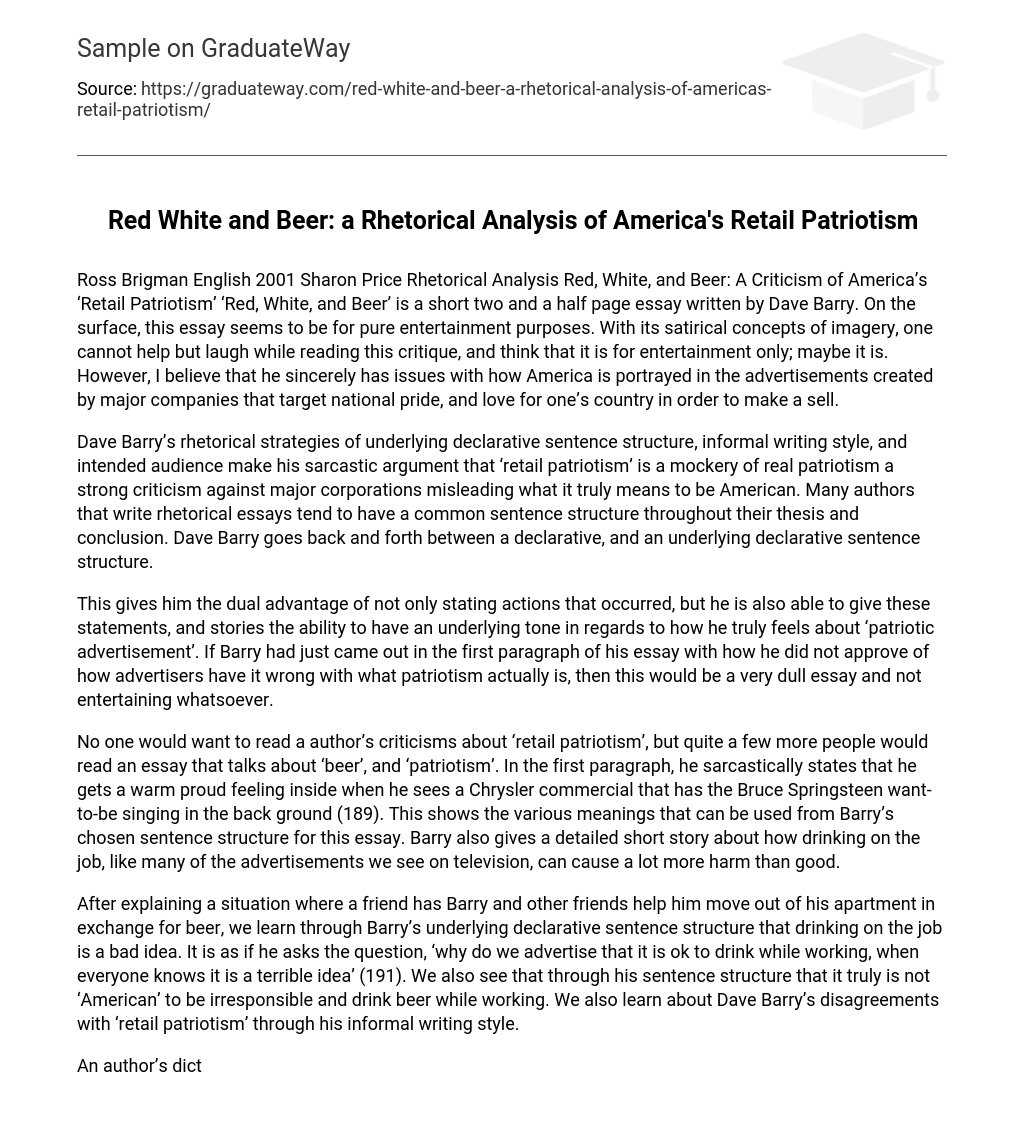Ross Brigman English 2001 Sharon Price Rhetorical Analysis Red, White, and Beer: A Criticism of America’s ‘Retail Patriotism’ ‘Red, White, and Beer’ is a short two and a half page essay written by Dave Barry. On the surface, this essay seems to be for pure entertainment purposes. With its satirical concepts of imagery, one cannot help but laugh while reading this critique, and think that it is for entertainment only; maybe it is. However, I believe that he sincerely has issues with how America is portrayed in the advertisements created by major companies that target national pride, and love for one’s country in order to make a sell.
Dave Barry’s rhetorical strategies of underlying declarative sentence structure, informal writing style, and intended audience make his sarcastic argument that ‘retail patriotism’ is a mockery of real patriotism a strong criticism against major corporations misleading what it truly means to be American. Many authors that write rhetorical essays tend to have a common sentence structure throughout their thesis and conclusion. Dave Barry goes back and forth between a declarative, and an underlying declarative sentence structure.
This gives him the dual advantage of not only stating actions that occurred, but he is also able to give these statements, and stories the ability to have an underlying tone in regards to how he truly feels about ‘patriotic advertisement’. If Barry had just came out in the first paragraph of his essay with how he did not approve of how advertisers have it wrong with what patriotism actually is, then this would be a very dull essay and not entertaining whatsoever.
No one would want to read a author’s criticisms about ‘retail patriotism’, but quite a few more people would read an essay that talks about ‘beer’, and ‘patriotism’. In the first paragraph, he sarcastically states that he gets a warm proud feeling inside when he sees a Chrysler commercial that has the Bruce Springsteen want-to-be singing in the back ground (189). This shows the various meanings that can be used from Barry’s chosen sentence structure for this essay. Barry also gives a detailed short story about how drinking on the job, like many of the advertisements we see on television, can cause a lot more harm than good.
After explaining a situation where a friend has Barry and other friends help him move out of his apartment in exchange for beer, we learn through Barry’s underlying declarative sentence structure that drinking on the job is a bad idea. It is as if he asks the question, ‘why do we advertise that it is ok to drink while working, when everyone knows it is a terrible idea’ (191). We also see that through his sentence structure that it truly is not ‘American’ to be irresponsible and drink beer while working. We also learn about Dave Barry’s disagreements with ‘retail patriotism’ through his informal writing style.
An author’s diction is what their writing style is. What was their overall vocabulary style choice? Was the essay formal or informal? These questions compromise what makes Dave Barry’s criticism of ‘retail patriotism’ more down to earth in order to not only reach a certain audience, but to also show that a point can be made without an over extensive or over complicated vocabulary. An example of this simplified yet educated writing is, “What we are talking about, according to the commercials, is that Miller is by God an American beer,” (190).
Barry subtly points out that America has been put on the back burner to advertisement. He shows us that even though one does not have to look up new words in the dictionary we can still get the point of a problem in our advertising media. I believe an author’s diction leads to what type of audience they intend to reach through their writing. Dave Barry’s intended audience is one of the main reasons this argument is so sound. An author has an intended audience for multiple reasons; mainly that a narrowed concentration of people makes the argument both more personal, and seemingly more reasonable towards said audience.
We can tell that Barry targets a specific audience that enjoys satire, and has had some exposure to ‘patriotic advertisement’ through examples like, “… I’m in favor of the upsurge in retail patriotism, which is lucky for me because the airwaves are saturated with pro-American commercials,” (191). The main reason the intended audience is so important to the vitality of Barry’s criticism of the ‘patriotic advertisements’, is that the audience is called to action The call to action in a satirical way was put in the last paragraph where Barry gave a hypothetical situation of an American commercial for laxatives, (191).
Because of this paragraph, we can infer that there is a call to action, which is: we as a nation should be downright offended by what advertising campaigns are saying about our nation; or about what we allow ourselves to be entertained and sold on. The intended audience would be the ones to actually do something about this though. This essay was overall very powerful in an indirect way as Dave Barry would want it.
Even though ‘Red White and Beer’ was very entertaining, the underlying message is what gave it such strength as a criticism of patriotic advertisements and the rhetorical strategies of underlying declarative sentence structure, informal writing style, and intended audience make his criticisms even stronger and a more compelling argument to consider looking further into and making a conscious decision pertaining to his points of what it really means to have pride for one’s country.





